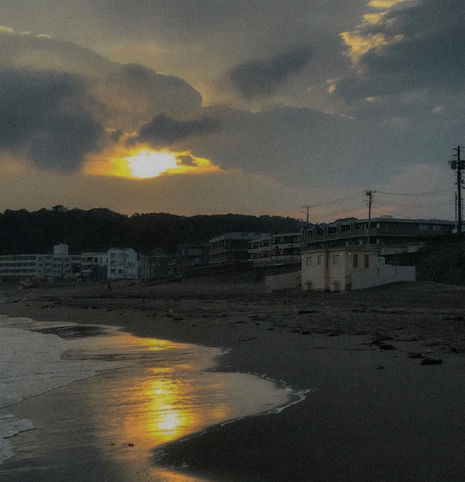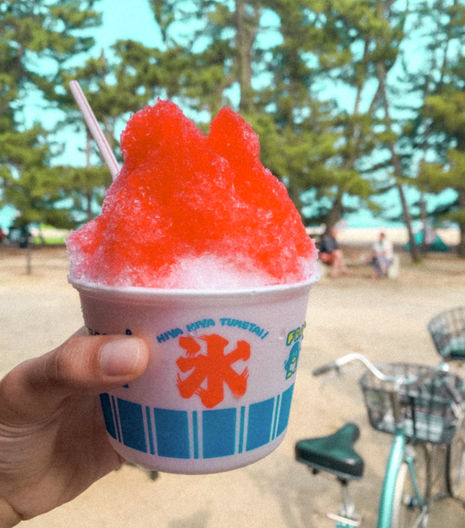Kamakura
Our first original composition of the term, Margaux Emmanuel‘s flash-fiction ‘Kamakura’ explores the depth and power of our imagination.

I turn the camera on. His silhouette is drawn against a pink sky. I approach him: his chest is bare, skin tanned, smile punctuated by two dimples. It’s morning, early, the soft sun rises over his shoulders and we can make out Enoshima from afar, floating, still asleep in her cradle of mist.
The cold Pacific water reddens his skin, but he’s indifferent, used to it. He wrings out a soaked beach towel, the cool water dampening the fine sand at his feet.
On Kamakura beach, we are alone, we can breathe. I turn the camera to the left: the Tanzawa mountains emerge from the cloudy sea. Here, everything is semi-opaque, far from Tokyo where each moment is heavy with languor.
The taste of the salty breeze rolls over my tongue; for a moment, I can forget the stale air of cigarettes hastily smoked during breaks and the nights in narrow alleys where drink after drink burns my throat.
He doesn’t know that life; he’s from here, he doesn’t know the feeling of a tie pressing against your neck, suffocating.
He calls my name, telling me to join him in the water. I’m not here, I’m behind the camera.
“Come on!” I’m not here.
The sun is now defying the blur of the mist. We then see boats speckling the horizon, their sails visible at a distance, lightly tossed around by the morning breeze.
It’s one of those mornings wet with dew and light, where every moment is a splash that ripples through my memory. I can disappear into the gentleness of everything around me. There, every moment –
Wait – I have to rewind the film.
There’s a forgotten game of go on the sand. It’s the afternoon, he basks in the sun without restraint, relaxed. His elongated body sculpts the warm sand.

There are empty kakigōri styrofoam cups next to us. We eat like kids; strawberry syrup runs all over our fingers, the white sand at our feet sprinkled with red droplets. He cannot stop laughing.
There is no clock framed on a wall behind us: time simply passes, unhurriedly. The waves advance furiously on the beach and then withdraw, a wild movement which escapes us, uncontrollable. We let ourselves be lulled by their noise, like a scratched vinyl that plays the same song over and over again, not an octave louder.
That’s Kamakura: days that go by like ricochets on water.
The sun melts into the sea, its last red flashes illuminating the waves.
I’m reaching the end of the roll.
He is no longer here. I can no longer see the shores, I can only feel their silhouettes still holding me. The lapping of the waves weakens, slowly lost in the noises of the city.
The salty air mingles with the smell of tobacco and diluted vending-machine coffee.
The film stops.
Cold light burns my eyes. “You better get those numbers for tomorrow.” A stack of papers is thrown onto my desk. “You will have them tonight, sir.”
There is a window close to my desk, with a view that overlooks countless skyscrapers reaching out to the horizon. You can’t see the beach from here.
I don’t think I’ve ever really been to Kamakura.
Close your eyes, be the spectator of your dreamed life.
To submit your own original composition, fiction, poetry or otherwise, contact the Varsity Arts editors.
 News / CUP announces funding scheme for under-represented academics19 December 2025
News / CUP announces funding scheme for under-represented academics19 December 2025 News / SU reluctantly registers controversial women’s soc18 December 2025
News / SU reluctantly registers controversial women’s soc18 December 2025 News / Cambridge welcomes UK rejoining the Erasmus scheme20 December 2025
News / Cambridge welcomes UK rejoining the Erasmus scheme20 December 2025 Features / Should I stay or should I go? Cambridge students and alumni reflect on how their memories stay with them15 December 2025
Features / Should I stay or should I go? Cambridge students and alumni reflect on how their memories stay with them15 December 2025 Film & TV / Timothée Chalamet and the era-fication of film marketing21 December 2025
Film & TV / Timothée Chalamet and the era-fication of film marketing21 December 2025









